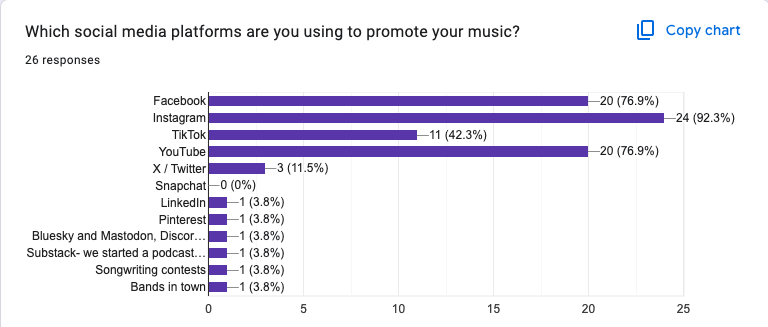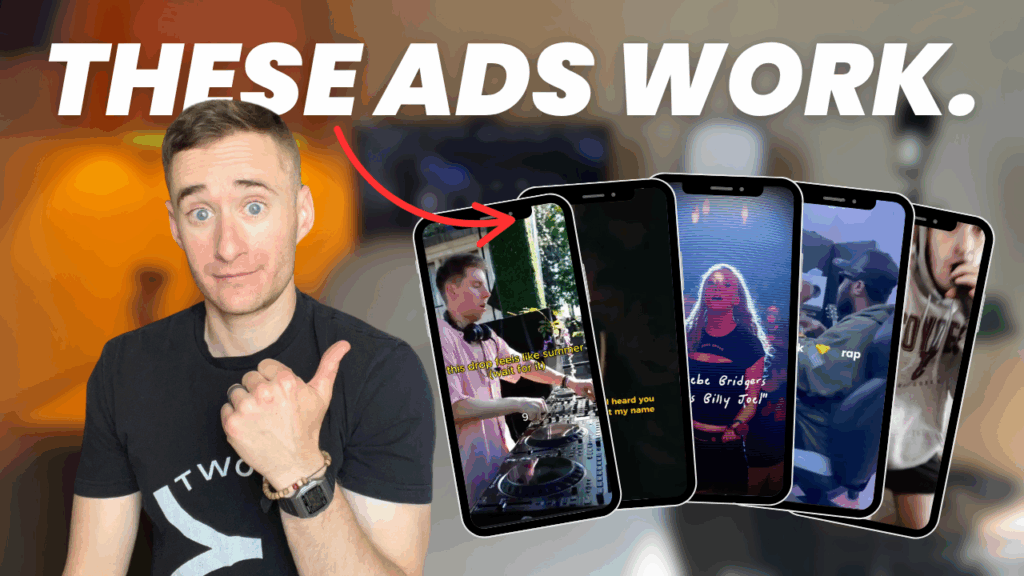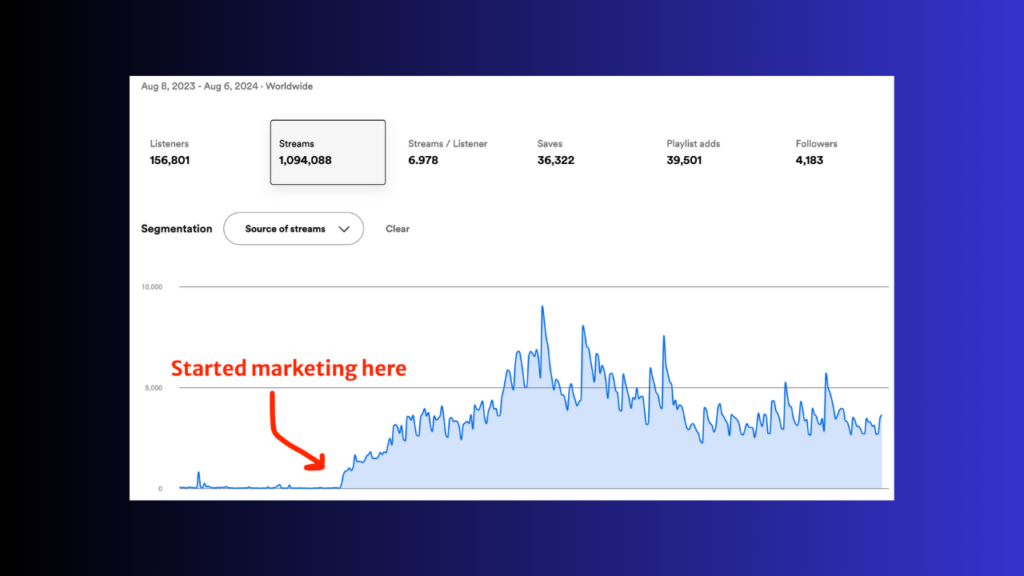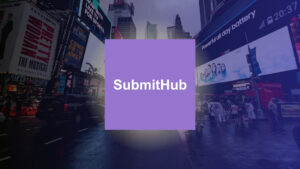Well, we’re going to talk more about social media today.
In case you are a normal person and don’t read every newsletter I write, here’s a quick recap of where we’ve been these past few weeks.
Two weeks ago, I sent out a short, four-question survey asking how artists use social platforms.
One week ago, I reported the results: 18 responses, almost all of them pretty salty about the fact that social media is a thing. So, in my survey summary, I mostly wrote about how grumpy social media makes us, but I also asked you guys to “let me know if you’re interested in another newsletter unpacking some actual social tactics.”
As it turns out, many of you were interested. Actually, I received more responses to last week’s email than I did to the initial survey.
Kind of lengthy small-font note incoming: Many of last week’s responses were very sympathetic. It seems that a lot of folks felt bad for me because of the relatively small initial survey response, as if I were this 89-year-old lady who got all dressed up to display her paintings at an art show only for nobody to attend. I’m weirdly flattered that people feel bad for me, but also, don’t. For one thing, I’ve asked this list to do like two bazillion different things over the past year, and for another thing, 18 survey responses from one email – even with a list of 12,000 people – isn’t as awful as it might sound. This is why you send seven emails when you launch a course or something… people (myself included) usually don’t do the thing you’re asking them to do unless you ask them seven times.
Anyway, this is all a long way of saying: thanks for caring about me, but really don’t worry. I am not feeling anything like that poor sad grandma.
According to the survey, apparently not all that much is working on social media. But by popular demand, we’ll cover the data and discuss the few things that are.
First, I thought this was kind of interesting:

That’s the data from the very first survey question. In case you can’t see the small numbers, it’s telling us that virtually every artist is on Instagram (24 out of 26 total respondents).
I think this makes sense, for several reasons. Demographically, Instagram is in kind of the sweet spot between TikTok (which trends pretty young) and Facebook (which trends pretty old). It’s also conducive to photos, obviously, which I think are easier to post than videos. And to top it off, it’s one of the few social platforms that can be directly linked from a Spotify profile.
The media has given TikTok a lot of hype as a music industry kingmaker, but I’ve heard more folks inside the industry refer to Instagram as a real mark of credibility. One respondent put it this way:
“I think of my Instagram as a bit of a resume or business card. So when I meet someone (in person or online) and they look me up, it’s clear who I am and what I’m doing.”
Spot on.
It’s also interesting to note that YouTube and Facebook are tied for second place – and that nothing else really comes close.
Okay, onto tactics. Here’s what’s working:
- Ads are working.
I can’t lie: half of me is gratified to report this, because running social ads for artists is the main source of revenue for my business. But the other half of me is not Scrooge McDuck and finds this whole game annoying. Shouldn’t the best content win, rather than the content with the biggest ad budget?
Regardless, the rise of social ads was probably inevitable given the business model of these platforms – which, boiled down, is basically “capture attention, then sell it.” What a wonderful world.
Here’s what a few artists had to say on this topic:
“You need a marketing budget – make quality assets, always be improving them, and run ads the right way the first time with an experienced ad manager. Learn from them. You might never want to run ads yourself, but it is good to start to understand it bit by bit. On the other hand, you might be able to run ads yourself if you learn the steps gradually.”
***
“Unless you’re actively spending money (which face it, we all have to do anyway) your chances of being seen and heard by anyone, whether stranger or fanatic, on socials is extremely limited. This is not going to get better on TikTok or Meta.”
***
“Running ads to my playlist [works]. Really simple promotional videos on IG and TikTok (text on screen, music in the background) seem to slowly add to a follower count.”
***
“Meta ads redirecting toward a link and then through to the streaming services [seem to be working].”
***
- Short-form videos are working.
This isn’t surprising, given the hype around TikTok. But it bears up across a bunch of different platforms that are not TikTok, including YouTube.
Here are a few indicative responses:
“Mini-vlog Reels were fun during release week. Stories [work], when I can. Sharing works in progress as Reels as I write new stuff [is working].”
***
“Short-form content on YouTube/TikTok [is working].”
***
“TikTok [is working] for finding new fans who come find me on the other places!”
***
“Instagram, Youtube Shorts, and Meta ads for Spotify [are working].”
***
- Real relationships are working.
This is probably my favorite point from the survey data: Several artists shared that their best social successes could be chalked up to authentic relationships.
One artist, for example, reported that “I believe both Facebook and Instagram are working reasonably well to address our local fanbase to let them know about shows and basic goings on. We don’t get a ton of engagement [online], but in person, people report being aware of us and what we’re doing as a result of socials.”
Another artist said they were having success “sending out personal messages to my Facebook friends, giving them the link to a new YouTube video.” That’s not as scalable (or, I guess, as cool) as going viral with a bunch of strangers. But it’s probably more meaningful.
And still another artist shared that “it’s fun to come up with bizarre ways to tell people about my music and I have made some seriously dedicated fans by showing up and being my fun weird self.”
This is the good stuff, people.
I think, at its best, social media isn’t just a megaphone for shouting messages out to the void. It’s a telephone, where meaningful conversation goes both ways.
As our survey shows, success on social media isn’t easy – or particularly common. But where it is possible, I tend to think that authentic relationship is probably the key.
Okay, that’s all on this topic – for a little while, at least.
If you want to read all of the survey results in their full context, here’s the link to the Google sheet. I’ve done my best to share what I see as the main themes from the data, but there are plenty of other interesting bits in there.
And finally, a big thanks again to everyone who filled out the survey! I am not a sad, lonely grandma, but I do really appreciate it.









